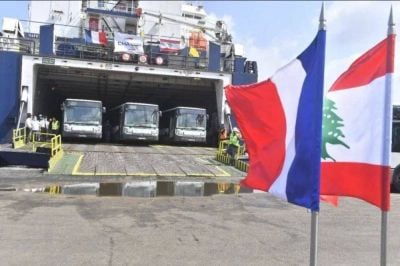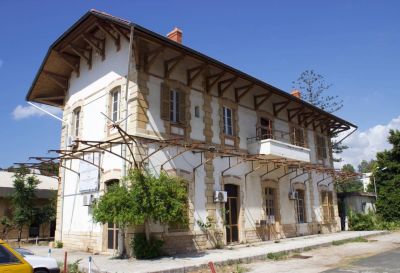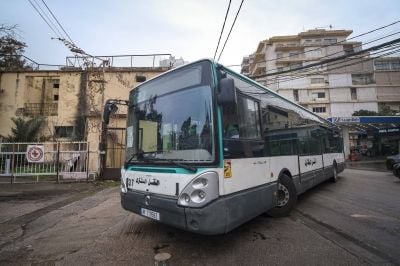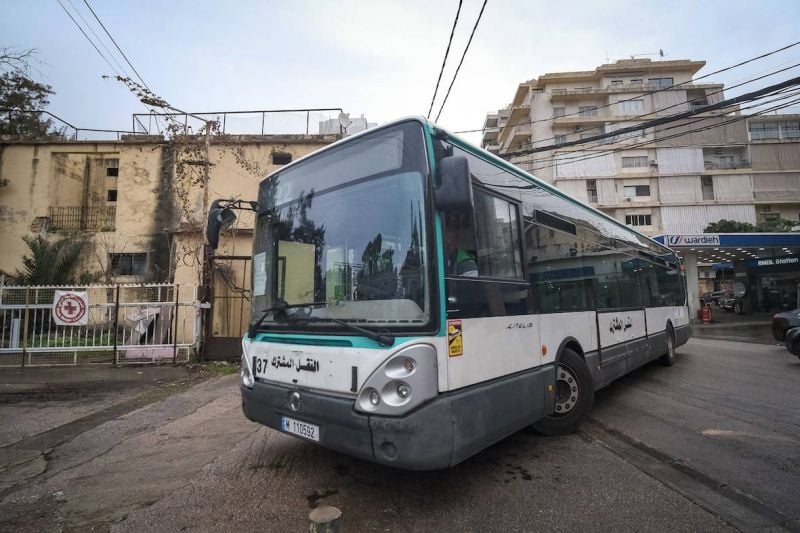
One of OCFTC’s French-donated buses cruising through Beirut’s Mar Mikhayel neigborhood, Jan 13, 2023. (Credit: João Sousa/L'Orient Today)
BEIRUT — The newly launched bus service operated by the Railways and Shared Transportation Authority (OCFTC, the institution’s French acronym) could grind to a halt in a matter of days unless the government allocates more funding to the one-month-old program. The buses that hit the road in mid-December 2022 are short on fuel and other supplies. Without a cash injection, they can continue “for two weeks max,” OCFTC director Ziad Nasr told L’Orient Today.
Another OCFTC official, Antoine Sahyouni, underscored this point, saying the buses will soon stop rolling without a government action. “Maybe a week, maybe ten days, maybe five days. It depends, but not more than that.” If the buses do stop, he added, the Authority will be ready to restart the service if, and when, the government allocates funding.
It’s an early obstacle for a program launched in mid-December using ten of the 50 buses the French government donated to Lebanon in May 2022. The Authority said last month it lacked the financial, material, and human resources to operate all 50 buses. The 2022 budget allocated just LL13 billion ($270,552 at the current market rate) to the agency.
Last month caretaker Public Works and Transport Minister Ali Hamieh told Annahar that the continuity of the program depended on securing funds from the finance ministry. At the time, Nasr told Annahar that the Authority issued tenders for the purchase of diesel, oil, and repair of facilities, but received no bids from private sector companies because of the latter’s wariness of lira-based contracts amid a fluctuating currency.
Hamieh told MTV’s Sar al-Wa2et Thursday night that the “problem of shared transportation is the exchange rate of the dollar, setting the service tariff, and covering the cost of maintenance. The solution is in partnership with the private sector.”
The Authority is now preparing to launch a tender for private sector companies to operate the buses.
Nasr and Hamieh did not immediately respond to L’Orient Today’s inquiries as to the thinking behind launching the program with insufficient funding.
L’Orient Today asked whether launching an underfunded service was a maneuver to pressure the government to allocate funding once the program was underway. Sahyouni replied that was a question better asked of the government, but agreed that starting the program is a form of pressure to fund it.
“We’re now using [the buses] so that people see we are able to operate. Come and bring [money],” he said. “The blockage isn’t coming from us employees in the administration. It’s from the government. It needs to issue a budget to bring supplies and people.”
Chadi Faraj, a co-founder of the NGO Riders Rights, which advocates for public transportation drivers and riders, said the OCFTC was backed into a corner to launch the buses “without the necessary preparation.”
“There was a lot of pressure on them, and a lot of mockery from people about the topic, asking where are the buses, what happened to the buses, were they stolen?” he said. “I think this was a communication problem."
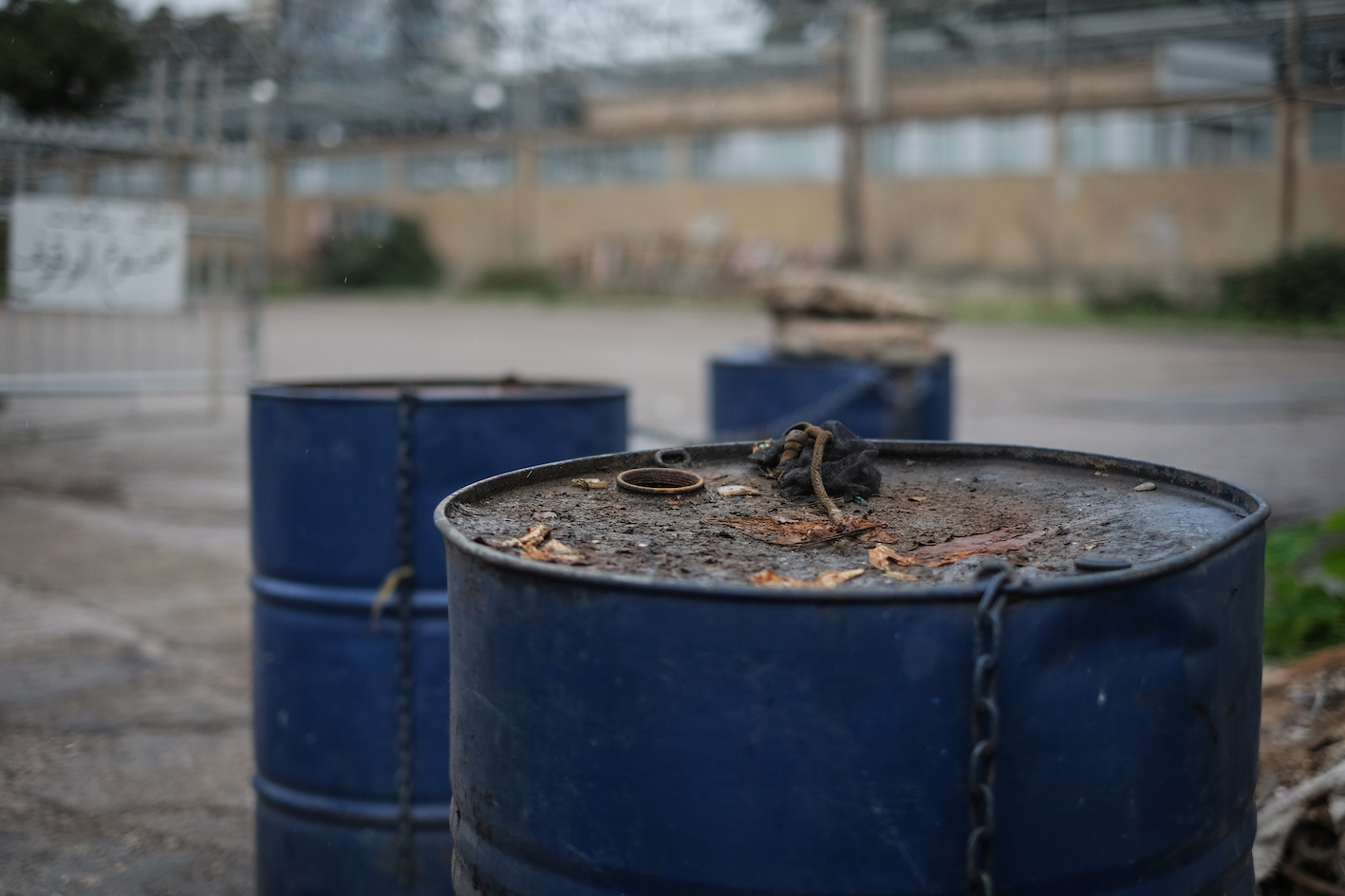 A disused fuel drum at the entrance to the OCFTC parking lot serves as a reminder that finding funding to fuel the new service is among the challenges facing the agency. Shot Jan 13, 2023. (Credit: João Sousa/L'Orient Today)
A disused fuel drum at the entrance to the OCFTC parking lot serves as a reminder that finding funding to fuel the new service is among the challenges facing the agency. Shot Jan 13, 2023. (Credit: João Sousa/L'Orient Today)
Maintenance with a limited budget
As of early Jan 2023, the buses operate Monday to Friday from around 7 am to around 5 pm, meaning they miss most workers’ evening commutes. This can’t be helped, Sahyouni says, because the bus hangar’s roof was blown off in the port explosion. No roof means no overhead lights, which means the buses cannot be cleaned, maintained, or checked for fitness after sunset.
Two inspectors, who spoke on condition of anonymity as they are not authorized to speak on behalf of the Authority, echoed this point, saying that buses require daily inspection and upkeep. This cannot be done after dark in a roofless hanger, especially during Lebanon’s rainy season.
In addition, there isn’t enough manpower to run the buses on Saturdays and Sundays, Sahyouni says. “The whole authority has emptied out. They reach [retirement] age and leave… Every year 20 to 30 leave. There’s no one left and the state isn’t hiring.” He estimates that the authority has fewer than a hundred employees left, down from a pre-crisis level of 1000. There remain 28 bus drivers for the ten buses.
State hiring has been frozen since 2017. Even if recruitment was open, it’s unclear whether people would line up to apply. The two inspectors said their salaries were LL2 million ($42) per month.
A few happy passengers amid unhappy competition
Sahyouni is unsatisfied with the number of riders, which he attributes to the low number of buses, which causes long wait times between buses. “As soon as the number of buses increases, people know that after five minutes the next one will come and they wait.”
On a recent afternoon round trip from Mar Mikhael to Laylaki and back, just one passenger boarded the bus on its southbound journey, and five boarded on the northbound return. Multiple people flagged down the bus, however, to ask about its route and schedule.
The few passengers on the bus were impressed. One customer, Fatima, said the LL20,000 ride compared very favorably to private minivans, which she considered small, uncomfortable, and dangerous. She and another woman, Sarah, said they used to ride state buses more than ten years ago, but this was their first time back on a publicly operated bus since the service was restarted. Fatima and Sarah said they would like to use the service again. “I’m very happy to support this,” Fatima said.
Faraj noted the public’s enthusiastic reception of the ten buses, saying it reflects the extent to which people were “waiting for such an opportunity to use more public transportation.”
Not everyone was happy. As the bus idled at its southern terminus, four men involved in operating a private minivan service accosted the bus driver and inspector, accusing them of “wanting to devour us.” They demanded the bus leave the area, complaining that they had five nearby vans waiting for passengers. The bus left shortly afterwards, on schedule.
The inspector said such exchanges were not uncommon, especially in the early afternoon when students leave class and are looking for a ride. He said the aggravated van drivers don’t bother him, and he doesn’t worry much about escalation. Some owners of van lines are rumored to have political connections. “I’m a state employee. Why should I fear?” he said. “I’m protected. If I wasn’t traveling with this bus, I wouldn’t be protected. The state protects it.”
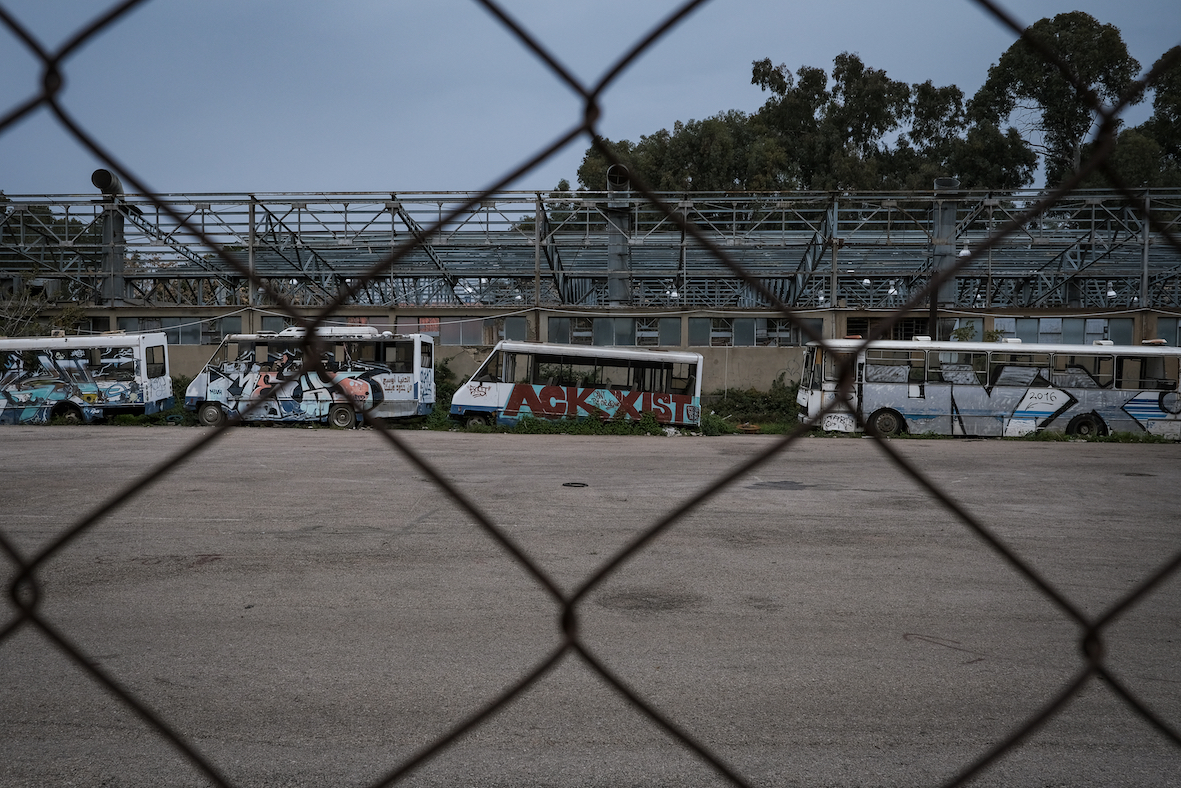 Adjacent the OCFTC hangar, roofless since the Aug 4, 2020, port blast, spent busses have become urban art. Shot Jan 13, 2023. (Credit: João Sousa/L'Orient Today)
Adjacent the OCFTC hangar, roofless since the Aug 4, 2020, port blast, spent busses have become urban art. Shot Jan 13, 2023. (Credit: João Sousa/L'Orient Today)
Restructuring and funding badly needed
Faraj said van operators deserve empathy, given their understandable anxiety over their livelihoods. He said that since the arrival of the French buses his group has been calling for the state to take into account the “existing sector” and find ways to cooperate with it to avoid throwing people out of work.
He noted that his organization has no problem with services being delivered by a public body or private company so long as the services are fairly priced and inclusive.
Faraj said that joint transportation cannot survive on gifts and needs proper funding. “It is a basic service such as water and electricity, and there must be an annual investment in its budget, like the rest of the services,” he said.
While the number of state-owned buses is currently low, if the anticipated tender for a private sector operator includes the 50 French buses as well as the 45 buses the OCFTC already owned, the impact on the informal transport sector could be larger.
“Imagine 100 buses on the lines. It will be a bit more impactful. There will be more competition and there will be more problems,” explains Faraj. “This is a big question. What will happen?
“We are always with the existing sector and support them because they have the right to work. They’ve been working for a long time, and they provide the service they’re able to. The solution is to find a way to support the sector and develop it, not break it and bring in unfair competition.”
